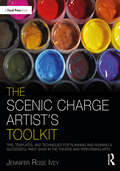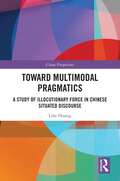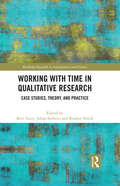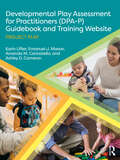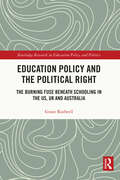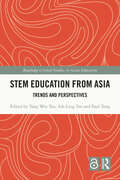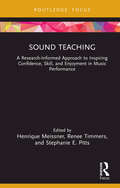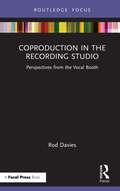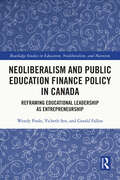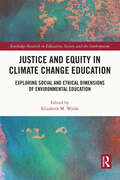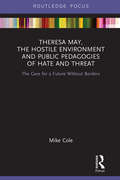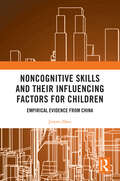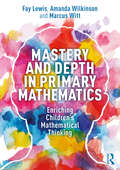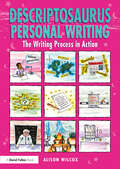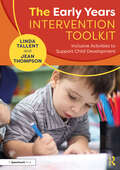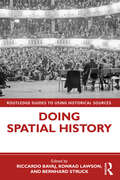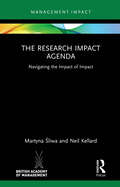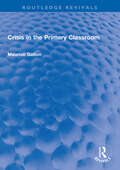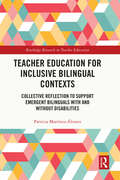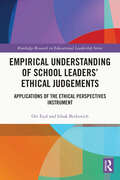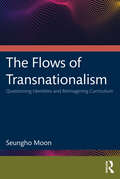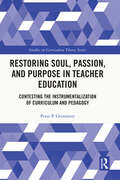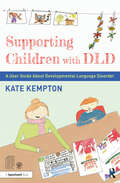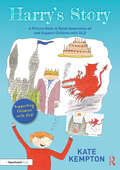- Table View
- List View
The Scenic Charge Artist's Toolkit: Tips, Templates, and Techniques for Planning and Running a Successful Paint Shop in the Theatre and Performing Arts (The Focal Press Toolkit Series)
by Jennifer Rose IveyThe Scenic Charge Artist’s Toolkit is a comprehensive guide to managing a theatrical paint shop. This book introduces the many different options available to a scenic charge artist, as well as the fundamental expectations and responsibilities of planning and running a shop. From the pre-production organization, budgeting, sampling, and sealing, to practical lessons in efficiency and shop maintenance, this text provides options to organize a paint shop no matter the size of the shop, show, or company. Filled with templates for labor and time estimation; tips on leadership and collaboration; techniques for painting and planning textures efficiently; and sustainable practices in health, safety, and wellness, this book provides guidance and practices to successfully manage the inevitable changes in theatre planning and production. It also offers tips and reference material on employment options, gaining employment, and excelling in this profession. Written for early career scenic artists in theatre and students of Scenic Art courses, The Scenic Charge Artist’s Toolkit fills in the gaps of knowledge for scenic artists in the budgeting, planning, and running of shops at summer stock, educational institutions, or freelance working environments. The text includes access to additional online resources such as extended interviews, downloadable informational posters and templates for budgeting and organizing, and videos walking through the use of templates and the budgeting process.
Toward Multimodal Pragmatics: A Study of Illocutionary Force in Chinese Situated Discourse (China Perspectives)
by Lihe HuangClassic pragmatic theories emphasize the linguistic aspect of illocutionary acts and forces. However, as multimodality has gained importance and popularity, multimodal pragmatics has quickly become a frontier of pragmatic studies. This book adds to this new research trend by offering a perspective of situated discourse in the Chinese context. Using the multimodal corpus approach, this study examines how speakers use multiple devices to perform illocutionary acts and express illocutionary forces. Not only does the author use qualitative analysis to study the types, characteristics, and emergence patterns of illocutionary forces, he also performs a quantitative, corpus-based analysis of the interaction of illocutionary forces, emotions, prosody, and gestures. The results show that illocutionary forces are multimodal in nature while meaning in discourse is created through an interplay of an array of modalities. Students and scholars of pragmatics, corpus linguistics, and Chinese linguistics will benefit from this title.
Working with Time in Qualitative Research: Case Studies, Theory and Practice (Routledge Research in Anticipation and Futures)
by Keri FacerThis volume creates a conversation between researchers who are actively exploring how working with and reflecting upon time and temporality in the research process can generate new accounts and understandings of social and cultural phenomena and bring new ways of knowing and being into existence. The book makes a significant contribution to the enhancement of the social sciences and humanities by charting research methods that link reflectively articulate notions of time to knowledge production in these areas. Contributors explore how researchers are beginning to adopt tactics such as time visibility, hacking time, making time, witnessing temporal power and caring for temporal disruptions as resources for qualitative research. The book collects fields as disparate as futures studies and history, literary analysis and urban design, utopian studies, and science and technology studies, bringing together those who are working with temporality reflexively as a powerful epistemological tool for scholarship and research inquiry. It surfaces and foregrounds the methodological challenges and possibilities raised. In so doing, this collection will serve as a resource for both new and experienced researchers in the humanities and social sciences, seeking to understand the tools that are emerging, both theoretical and methodological, for working with time as part of research design. This book will be of great interest to students and scholars of research methods, time and temporality, future studies, and the environmental humanities.
Developmental Play Assessment for Practitioners (DPA-P) Guidebook and Training Website: Project Play
by Karin Lifter Emanuel J. Mason Amanda M. Cannarella Ashley D. CameronDevelopmental Play Assessment for Practitioners (DPA-P) Guidebook and Training Website: Project Play offers a comprehensive assessment of naturally occurring play activities for evaluating young children’s developmental progress accurately, so that useful interventions can take place as early as possible. It can be used by practitioners in a wide range of educational and therapeutic settings and is designed to support developmental progress through planning interventions in play, and using what we know about a child’s progress in play to plan play-based interventions in cognition, language, motor, social-emotional, and self-help skills. The guidebook and training website provide a comprehensive introduction to how to successfully use the assessment with infants, toddlers, and young children with disabilities or at risk for disabilities. The comprehensive guidebook offers an overview of the DPA-P and Project Play, defines play, discusses the background literature on play, and explains why this assessment is needed. Clear guidance helps practitioners and family members understand play, how to evaluate play, and how to use play for different purposes. The guidebook offers: an introduction to the comprehensive training website and how to use it understanding of the categories of play assessed and their definitions guidance on how to administer the assessment and prepare a summary evaluation of a child’s performance clear instructions for the coding sheets and scoring guidelines for constructing sets of toys guidance on taking the results of the DPA-P evaluation of a child’s progress in play to develop a plan of activities for intervention explanation of how you evaluate activities at the absence, basic, emergence, and mastery levels for developing a plan suggestions for assembling sets of toys for intervention, based on toys available in children’s homes and early childhood settings procedures for facilitating or teaching play activities to children who are developing more slowly than their peers technical aspects of the assessment To make the DPA-P as flexible as possible for all practitioners, it also offers guidance on adaptations for administering the test, in the coding sheets, with toys to enhance cultural appropriateness for gathering the observations, and for supporting interventions in play. The Developmental Play Assessment for Practitioners (DPA-P) can be used in natural settings and takes 30 minutes to complete. It is a valuable tool for all those who serve, or are training to serve, young children in early childhood settings, schools, service agencies, colleges, and universities. It will be of great benefit for early intervention personnel, speech-language pathologists, physical therapists, occupational therapists, and psychologists.
Education Policy and the Political Right: The Burning Fuse beneath Schooling in the US, UK and Australia (Routledge Research in Education Policy and Politics)
by Grant RodwellThis work attempts a comparative description and analysis, focusing on the US, the UK, and Australia on the topic of the Right, educational policy, and schooling. It adopts as its underlying theme the burning fuse in tracing the topic back to Joseph de Maistre a Rightist who fled revolutionary France to seek safety in the company of Tsar Alexander I’s Russian Empire. Here, he had much to say about school education, not for all, but rather the “deserving” social elite. During the past three or four decades in the US, the UK, and Australia, the Right has been remarkably successful in amassing political power. And in doing so, the right of politics in these countries has reshaped school educational policy and practice, a necessary step in securing the future of the Right as a political force. Moreover, even during the years the Right has been on the opposition benches in these countries, such has been the strength of their political force that governments of the Left have acquiesced to much of their school educational policy. A pioneering effort, this book asserts that to understand school educational policy in the third decade of the 21st century, we need to comprehend the politics of the Right. This book will be of interest to researchers and postgraduate students interested in Education Studies, Theory and Policy, and International and Comparative Education.
STEM Education from Asia: Trends and Perspectives (Routledge Critical Studies in Asian Education)
by Aik-Ling Tan Tang Wee Teo Paul TengAsia is the largest continent in the world. Five out of the top ten high performing economies in the Programme for International Student Assessment (PISA) 2018 are located in Asia. Why do Asian students perform so well in STEM-related subjects? This book answers this by examining the STEM education policies and initiatives in Asian economies, as well as the training programmes undertaken by STEM teachers in Asia. The book is broken into four sections, each accompanied by a passage of commentary that summarizes the key takeaways of the chapters. Section one focuses on STEM policy environments and how various countries have developed policies that promote STEM as an integral part of national economic development. Section two focuses on STEM teacher education in the Philippines and Thailand, while section three focuses on STEM curriculum design, context, and challenges in four Asian economies. The fourth and final section focuses on presenting snapshots of STEM education research efforts in Malaysia, South Korea, and Singapore. Written by Asian academics, this book will provide valuable insights to policy makers, educators, and researchers interested in the topic of STEM education, especially in the Asian context.
Sound Teaching: A Research-Informed Approach to Inspiring Confidence, Skill, and Enjoyment in Music Performance
by Henrique Meissner Renee Timmers Stephanie E. PittsSound Teaching explores the ways in which music psychology and education can meet to inspire developments in the teaching and learning of music performance. The book is based on music practitioners’ research into aspects of their own professional practice. Each chapter addresses a specific topic related to musical communication and expression, performance confidence and enjoyment, or skill development in individual and group learning. It explains the background of the research, outlines main findings, and provides suggestions for practical applications. Sound Teaching provides a research-informed approach to teaching and contributes to music tutors’ professional development in teaching children and adults of various ages and abilities. Sound Teaching is written for vocal and instrumental music teachers, music performers with a portfolio career, and music students at conservatoires and universities. Music students undertaking practice-related research will find examples of research methodologies and projects that are informative for their studies. Musical participants of all kinds – students, teachers, performers, and audiences – will find new ways of understanding their practice and experience through research.
Coproduction in the Recording Studio: Perspectives from the Vocal Booth
by Rod DaviesCoproduction in the Recording Studio: Perspectives from the Vocal Booth details how recording studio environments affect performance in the vocal booth. Drawing on interviews with professional session singers, this book considers sociocultural and sociotechnical theory, the modern home studio space, as well as isolation and self-recording in light of the COVID-19 pandemic. This is cutting-edge reading for advanced undergraduates, scholars and professionals working in the disciplines of recording studio production, vocal performance, audio engineering and music technology.
Neoliberalism and Public Education Finance Policy in Canada: Reframing Educational Leadership as Entrepreneurship (Routledge Studies in Education, Neoliberalism, and Marxism)
by Wendy Poole Vicheth Sen Gerald FallonThis book uses a multi-dimensional conceptual framework to demonstrate how neoliberal forces have been manifested through changes to K–12 public education finance policy in British Columbia, Canada between 2001 and 2015. The text offers in-depth critical policy analysis to illustrate how the public education system has been impacted by the emergence of a hybrid model of public-private funding. By examining the impacts of this neoliberalized model, in which school districts must compete for public funding and engage in for-profit activities, the book highlights emerging financial inequalities; exacerbated inequities for students; increased entrepreneurialism; closer alignment of administrators’ subjectivities with a managerial approach to educational leadership; and an illusion of local autonomy. Ultimately, the text makes powerful contributions by calling attention to detrimental processes of neoliberalization, marketization, and privatization within public education, as well as the managerialization of educational leadership. This text will benefit researchers, academics, educators, and educational leaders with an interest in the politics of education policy and finance, school district leadership, international and comparative education, and the sociology of education.
Justice and Equity in Climate Change Education: Exploring Social and Ethical Dimensions of Environmental Education (Routledge Research in Education, Society and the Anthropocene)
by Elizabeth M. WalshThis volume looks at the ways in which climate change education relates to broader ideas of justice, equity, and social transformation, and ultimately calls for a rapid response to the need for climate education reform. Highlighting the role of climate change in exacerbating existing societal injustices, this text explores the ethical and social dimensions of climate change education, including identity, agency, and societal structure, and in doing so problematizes climate change education as an equity concern. Chapters present empirical analysis, underpinned by a theoretical framework, and case studies which provide critical insights for the design of learning environments, curricula, and everyday climate change-related learning in schools. This text will benefit researchers, academics, educators, and policymakers with an interest in science education, social justice studies, and environmental sociology more broadly. Those specifically interested in climate education, curriculum studies, and climate adaption will also benefit from this book.
Justice and Equity in Climate Change Education: Exploring Social and Ethical Dimensions of Environmental Education (Routledge Research in Education, Society and the Anthropocene)
by Elizabeth M. WalshThis volume looks at the ways in which climate change education relates to broader ideas of justice, equity, and social transformation, and ultimately calls for a rapid response to the need for climate education reform. Highlighting the role of climate change in exacerbating existing societal injustices, this text explores the ethical and social dimensions of climate change education, including identity, agency, and societal structure, and in doing so problematizes climate change education as an equity concern. Chapters present empirical analysis, underpinned by a theoretical framework, and case studies which provide critical insights for the design of learning environments, curricula, and everyday climate change-related learning in schools. This text will benefit researchers, academics, educators, and policymakers with an interest in science education, social justice studies, and environmental sociology more broadly. Those specifically interested in climate education, curriculum studies, and climate adaption will also benefit from this book.
Theresa May, The Hostile Environment and Public Pedagogies of Hate and Threat: The Case for a Future Without Borders (Routledge Research in Education Policy and Politics)
by Mike ColeTheresa May, The Hostile Environment and Public Pedagogies of Hate and Threat analyses Theresa May’s involvement in the creation and promotion of public pedagogies of hate and threat around the issue of immigration, which are used to instil fear, stress and anxiety among large sections of the population. This book uses public pedagogy as a theoretical lens and examines the economic and political backdrop to the hostile environment, before moving on to a consideration of its creation and consolidation by Theresa May as Home Secretary and later as Prime Minister. The effects of the hostile environment on health and education are addressed, as well as its specific impacts on asylum seekers and women. The book also interrogates the Windrush scandal and divided families, as well as the author and his family's personal experiences of the hostile environment. It concludes by considering the escalation of racism in general, the crisis in neoliberalism, and the case for a socialist future without borders. This topical book will appeal to doctoral, postgraduate and advanced undergraduate students in the fields of education studies, pedagogy and sociology as well as those interested in UK politics.
Noncognitive Skills and Their Influencing Factors for Children: Empirical Evidence from China
by Jinyan Zhou"Non-cognitive skills" cover any skills that are not cognitive, such as conscientiousness, perseverance, and teamwork, which are critically important in education. However, for many years, “non-cognitive skills" have always been ignored in human capital theory. The book, using a multidisciplinary approach, tries to uncover the noncognitive components of human capital, so as to answer the question “what is the skill that should be invested". The author expands the connotations of human capital by exploring the value of noncognitive skills and their production patterns, constructing a measurement framework and a set of tools to measure noncognitive skills. She especially carries out an empirical survey which covers primary and secondary school students from seven provinces of China's East, Middle, and West areas. With the data collected, she analyzes Chinese students' noncognitive development and further identifies the critical factors that may impact their noncognitive skills by applying the Bayesian Model Average approach. The book will be a theoretical contribution to education economics. Researchers interested in education in China, children’s development and policymakers in the field of education will find this book helpful and resourceful.
Mastery and Depth in Primary Mathematics: Enriching Children's Mathematical Thinking
by Fay Lewis Amanda Wilkinson Marcus WittThe UK National Curriculum is clear about the importance of reasoning and problem-solving in mathematics. Mastery and Depth in Primary Mathematics aims to support trainee and established teachers to embed mathematical thinking into their lessons. The authors focus on practical and actionable ways that primary teachers can develop their children’s mathematical thinking, reasoning and problem-solving: ideas which are at the heart of the UK National Curriculum. Covering a range of areas in mathematical thinking such as reasoning, problem-solving and pattern-spotting, as well as systematic and investigative thinking, each chapter provides clear examples of how teachers can make small, manageable ‘rich tweaks’ to their existing lessons to increase the opportunities for children to develop their mathematical thinking. Teachers will be able to dip into the book and find inspiration and ideas that they can use immediately and, importantly, develop a set of principles and skills which will enable them to take any mathematical activity and tweak it to develop their pupils’ thinking skills. This practical guide will be invaluable to all trainee teachers and early-career teachers that wish to enhance their primary mathematics teaching.
Descriptosaurus Personal Writing: The Writing Process in Action
by Alison WilcoxDescriptosaurus Personal Writing provides young writers with an opportunity to link their personal lives and school experiences, and gives writing a meaningful and personal context. It is a resource that will guide and scaffold students to produce vivid, powerful, descriptive and meaningful personal texts, and, acting as a springboard for other genres, will dramatically improve the quality of their writing in all areas. It provides a detailed step-by-step guide through the writing process by using personal narratives to develop the skills, knowledge and understanding of writing a text. It demonstrates different techniques, and provides useful tips and suggestions on how to revise a text and transform it into a powerful, descriptive personal narrative. With prompts, plans, methods and models for poetry and prose, this book helps tackle each stage of the writing process from planning and writing a first draft to revising and editing. Descriptosaurus Personal Writing is an ideal vehicle for welcoming and celebrating different cultures, experiences and stories into the writing curriculum: an invaluable resource to dramatically improve children’s writing for all KS2 primary and KS3 secondary English teachers, literacy coordinators and parents.
The Early Years Intervention Toolkit: Inclusive Activities to Support Child Development
by Linda Tallent Jean ThompsonThe Early Years Intervention Toolkit provides a range of ready-made activities to enable early years practitioners and health visitors to address observed difficulties in a child’s development prior to starting school. It includes a checklist of observed behaviours which links to a range of effective and engaging activities to support children’s development across the three prime foundational areas of learning: Communication and Language; Physical Development; and Personal, Social and Emotional Development. Activities focus on a variety of crucial skills such as speaking and listening, moving and handling, and forming relationships, making use of materials that are readily available in every early years setting. This toolkit offers: A time-saving approach to interventions, with additional guidance on planning, providing, and recording appropriate interventions Advice and activities to share with parents for them to try at home A framework to enable early years practitioners to identify specific difficulties in key areas of development Downloadable resources to support activities and interventions The Early Years Intervention Toolkit is an inclusive programme and all children in the early years will benefit from taking part in the activities. It will be an essential resource for early years practitioners to effectively identify and support learning needs in child development and will boost the confidence of young children as they prepare for Key Stage One.
Doing Spatial History (Routledge Guides to Using Historical Sources)
by Riccardo Bavaj Konrad Lawson Bernhard StruckThis volume provides a practical introduction to spatial history through the lens of the different primary sources that historians use. It is informed by a range of analytical perspectives and conveys a sense of the various facets of spatial history in a tangible, case-study based manner. The chapter authors hail from a variety of fields, including early modern and modern history, architectural history, historical anthropology, economic and social history, as well as historical and human geography, highlighting the way in which spatial history provides a common forum that facilitates discussion across disciplines. The geographical scope of the volume takes readers on a journey through central, western, and east central Europe, to Russia, the Mediterranean, the Ottoman Empire, and East Asia, as well as North and South America, and New Zealand. Divided into three parts, the book covers particular types of sources, different kinds of space, and specific concepts, tools and approaches, offering the reader a thorough understanding of how sources can be used within spatial history specifically but also the different ways of looking at history more broadly. Very much focusing on doing spatial history, this is an accessible guide for both undergraduate and postgraduate students within modern history and its related fields.
The Research Impact Agenda: Navigating the Impact of Impact (Management Impact)
by Martyna Śliwa Neil KellardThis book contributes to the growing body of work addressing the processes and consequences of national governments’ audits of the performance of higher education institutions (HEIs) in different countries. The book discusses one recent area of focus within these audits, namely the measurement of universities’ societal and economic impact. The Research Impact Agenda offers a problematisation of the research impact agenda, especially in relation to the impact generated by academics based in schools of business and management. It scrutinises the often unintended but nevertheless significant consequences of this agenda for individuals and higher education institutions, such as the reproduction of existing inequalities in academia and the crowding out of other key activities of business schools. It puts forward a range of recommendations for researchers, policymakers, university and business school leaders, and individual academics. The book will be of interest to a wide range of readers – regardless of their formal position, organisational affiliation or career stage – who consider it important to reduce and remove inequalities and inequities within the HE sector and to make universities and business schools more inclusive. The readers will benefit from the opportunity to engage in reflection aimed at transforming the current framing, delivery and assessment of business and management research impact.
Crisis in the Primary Classroom (Routledge Revivals)
by Maurice GaltonFirst published in 1995, Crisis in the Primary Classroom redefines the crisis plaguing primary classrooms by challenging many of the educational and political orthodoxies of the nineties. The book is set during a particular period in the nineties when primary education was under attack from the Government and sections of the media, with accusations that reading standards had fallen, the National Curriculum was not being taught well and training colleges had failed to produce sufficient teachers of quality. In response to these concerns, the Government commissioned a report, which presented a series of solutions. Maurice Galton argues that the report failed to identify the root causes of the problems facing primary schools. He examines critically whether the National Curriculum was necessary, and whether teaching methods and classroom organization really needed to be changed radically. He also addresses the issue of quality among teachers, suggesting ways in which this might be developed. Crisis in the Primary Classroom deserves to be read by all concerned with the planning, administration and practice of primary education. Teachers will be encouraged by the message that methods found to be successful in the past must be accommodated in new patterns of organization and classroom practice.
Teacher Education for Inclusive Bilingual Contexts: Collective Reflection to Support Emergent Bilinguals with and without Disabilities (Routledge Research in Teacher Education)
by Patricia Martínez-ÁlvarezThis text demonstrates how collective reflection can function as a central part of effective teacher preparation for work in inclusive bilingual environments. Through analysis of rich qualitative data, Teacher Education for Inclusive Bilingual Contexts shows how group reflection supports pre-service educators to recognize the intersectional challenges faced by students, and understand their identities beyond the confines of disability. This, in turn, engenders reconceptualization of standardized expectations and implicates the educator in developing student agency through individualized use of routine, language, and materials. The author offers Cultural Historical Activity Theory (CHAT) and Disability Studies in Education (DSE) as a basis for dialectal interactions to unearth contradictions and misunderstandings surrounding language acquisition and the learning of emergent bilinguals, and highlight the ways in which educators can disrupt oppressive practices through expansive learning practices. This insightful volume will be of interest to researchers, scholars, and postgraduate students in the fields of inclusive education and disability studies, bilingual and language education, and teacher education.
Empirical Understanding of School Leaders’ Ethical Judgements: Applications of the Ethical Perspectives Instrument (Routledge Research in Educational Leadership)
by Ori Eyal Izhak BerkovichThis volume offers a holistic, empirically grounded examination of the factors which influence educational leaders’ ethical judgments in their day-to-day work in schools. Drawing on a range of quantitative studies, the text utilizes organizational psychology to explore multiple ethical paradigms. It considers social aspects including ethnicity, gender, hegemony-minority relations, and leadership styles which influence and drive ethical judgment patterns employed by educators and principals. The book ultimately demonstrates the Ethical Perspectives Instrument (EPI) as an effective tool for the assessment of various ethical viewpoints and their interactions, suitable for application to diverse cultures and socio-educational circumstances. An important study of the leaders’ ethics and preparation in handling marginalized populations, this book will be valuable for academics, researchers, and graduate students working in the fields of educational leadership, organizational psychology, and the sociology of education.
The Flows of Transnationalism: Questioning Identities And Reimagining Curriculum
by Seungho MoonThis reflexive, transcultural dialogue scholarship integrates autobiography alongside an in-depth, critical analysis of Eastern and Western philosophy. Moon revisits his cultural heritage providing rich narratives that debunk a universalized, Eurocentric approach to truth in the contemporary curriculum and social discourse. As an exploration of multiple versions of knowing and identities, The Flows of Transnationalism allows readers to extend and invent their own approaches to examining the fluidity of identities. Moon promotes diverse perspectives within curriculum studies by disrupting the self-other and cultural sameness-difference dichotomy. Amid the urgent need of developing anti-racist pedagogy, this book provides an innovative way to studying identities in a transnational context. This thought-provoking book on transculturalism, cultural identities, and curriculum is intended to benefit educators, university faculty, and interested members of the public. It is written for those who have the desire to learn and apply diverse approaches for engaging with cultural identities through lived experience and its sociopolitical interpretation.
Restoring Soul, Passion, and Purpose in Teacher Education: Contesting the Instrumentalization of Curriculum and Pedagogy (Studies in Curriculum Theory Series)
by Peter P. GrimmettThis text both challenges and traces the development of a culture of regulation, standardization, performativity, and governmentality evident in Anglophone teaching practice and education. Framed by a brief history of teacher education research and policy in North America over the last six decades, the text argues that the instrumentalization of curriculum and pedagogy has robbed teachers of their pedagogical soul, passion, and purpose. Using a conceptual model, Grimmett forges a pathway for teachers to adopt a soulful way forward in professional practice, individually and collectively enhancing autonomy over programs, and protecting the public trust placed in them as educators. This text will benefit researchers, academics, and educators with an interest in teachers and teacher education, educational policy and politics, and curriculum thinking and enactment more broadly. Those specifically interested in pedagogy, educational change and reform, and the philosophy of education will also benefit from this book.
Supporting Children with DLD: A User Guide About Developmental Language Disorder (Supporting Children with DLD)
by Kate KemptonFor effective use, this book should be purchased alongside the illustrated picture book Harry’s Story. Both books can be purchased together as a set, Supporting Children with DLD: A Picture Book and User Guide to Learn About Developmental Language Disorder [978-0-367-70920-4]. Supporting Children with DLD, has been developed to help raise awareness of Developmental Language Disorder, and to highlight the impact of the condition from the child’s point of view. With activities, prompts and sample questions, this is an essential resource to enable adults to understand the reality of living with DLD, helping children feel heard and respected, as well as providing a solid foundation for tailoring support to individual needs. Drawing on specific examples from Harry’s Story, the book does not assume any prior knowledge of DLD and is designed to offer the reader accessible information and practical advice, teaching as you go. This book: Highlights the link between spoken and written language, addressing the need to recognise the literary difficulties faced by children with DLD Provides practical activities and worksheets that can be used to help children express themselves and ask for help Offers strategies for supporting children’s understanding of language, based on common situations and experiences explored in Harry’s Story Written to be an accessible introduction to DLD and its effect on children’s lives, this is an essential resource for parents and professionals looking to understand the condition.
Harry's Story: A Picture Book To Raise Awareness Of And Support Children With Dld (Supporting Children with DLD)
by Kate KemptonFor effective use, this book can be purchased alongside the professional guide, Supporting Children with DLD. Both books can be purchased together as a set, Supporting Children with DLD: A Picture Book and User Guide to Learn About Developmental Language Disorder [978-0-367-70920-4]. This beautifully illustrated picture book has been created to develop awareness of Developmental Language Disorder and provides a unique opportunity to sensitively gain children’s perspectives of the condition. Harry enjoys school, but faces daily challenges due to his language difficulties. When he is asked to write a story, he struggles to find the words to put his thoughts onto paper. He learns to share his stories through pictures instead and, in doing so, helps his supportive teacher understand what she can do to make life easier for him. With bright illustrations and language that can be accessed by children with DLD, this story can be used to start conversations about the lived experience of children with Developmental Language Disorder, giving them a voice and helping them express their thoughts and feelings. It can also be used as a training tool for teachers and other professionals. This is an essential resource for parents and practitioners looking to understand and support children with DLD.
